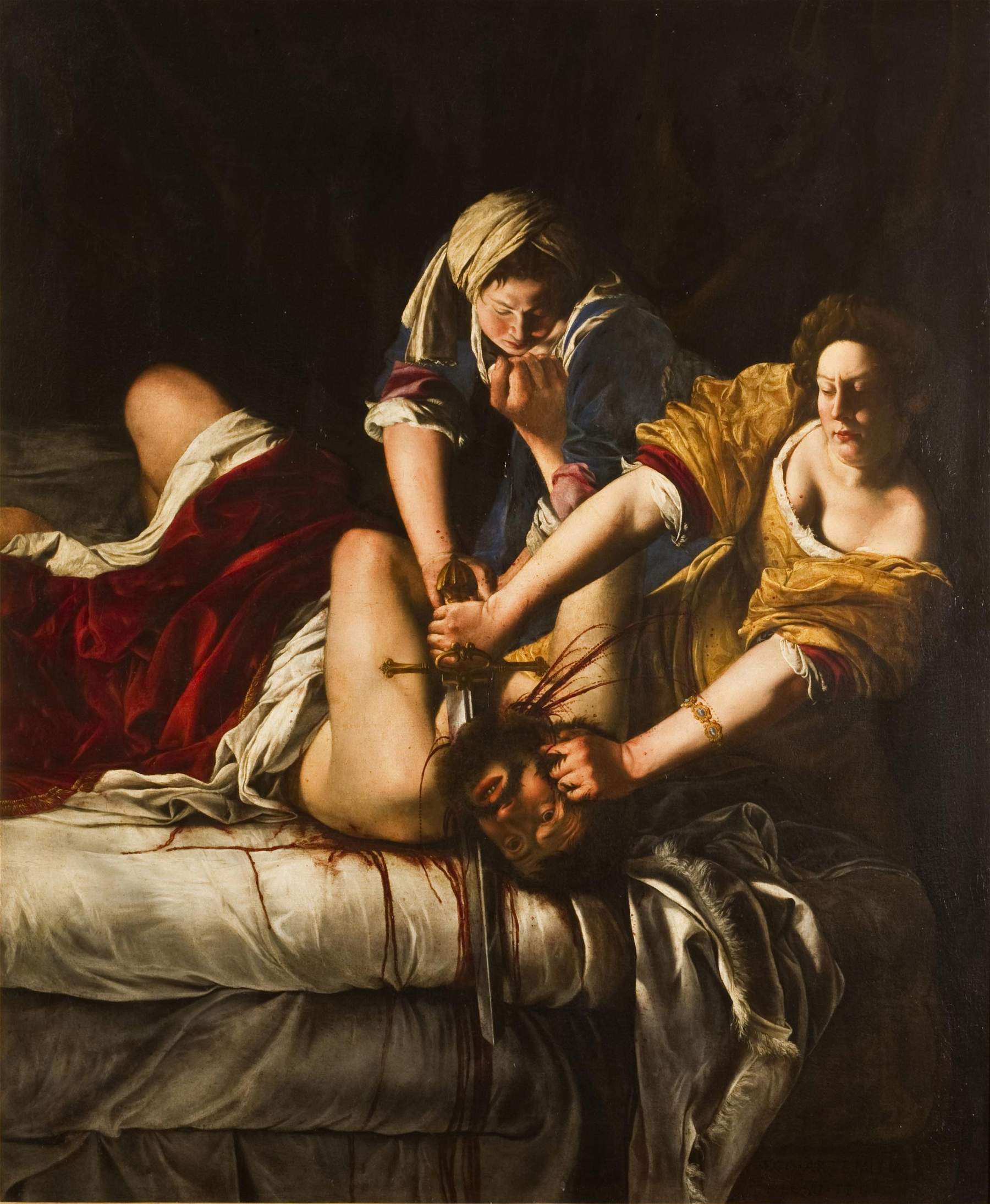It seems to me to be in the true, a true unspeakable, forming on Artemisia’s lips these words. At least once she must have said them, with that Spanish albagia that she learned, after thirty, in Naples. She lifted the hard chin of stubborn blonde and passed out with Tuscan precipitation those flowing syllables: Holofernes. Syllables that only today, decanted from estranged distant events, release the juice of a bizarre smile, at once shy and insolent, just the bottom of a character and a custom. “Does it give you the spirit, Lady Artemisia, to paint this grand canvas for the Serenissima? A heroic subject, from your side.” It was, perhaps, an ironic proposal, from mocking man to haughty woman. And already in Artemisia’s mind everything was ready. Holofernes, Judith and Holofernes. The head wrapped in a cloth. No, the naked, bloody head. And why not the body, the big body of the tyrant? Let them see, these Tuscans, if I can draw.
It cannot be that Artemisia did not say to her friends: I have an engagement of importance for the Serenissima. But already they all knew and took every pretext, imperious, insinuating, stunned, to pry. They would find the painter enclosed in her workhouse, her floppy hair spiky, her face pulled by fatigue: standing or sitting on a high perch, in front of the large canvas. They remained interdicted and inoperative before gestures that they did not know and that she abandoned to their greed, oblivious to compose herself, to appear as she wanted them to see her: sometimes miserable, almost crushed by the work; sometimes majestic, daring. [...]

By now the friends, while continuing that sort of siege, were entertaining each other with a nonchalance that reassured her, on her perch, and almost declared her absent. But from the gloves, from the perfumes, there was not a day that, on the recurring motif of domestic engagements, the talk did not stop about the men of the house, the men outside: and at once the rumors heated up. It would begin, perhaps, from the top. The present Grand Duke, the good-hearted Grand Duke, the foreign Princes and the homegrown ones: each one seen by keen and watchful eyes, not in the open air, with arms and horse, but seated within four walls, in the act of drinking, of eating; above all of going into a rage: and the examples bring them back home. The one yells, the other curses, what eyes does Thomas make, Vieri’s grit. They dominated the repressed and excited voices of the two Torrigiani who ended up saying more than they wanted to and, having thrown the arrow, were ready to cover themselves with the shield of conjugal love. But meanwhile each had named the other’s husband, offense or service they rendered each other. To the open mockery Violante launched herself, the freest, unparalleled in portraying manly brutality combined with bawdiness and the ease with which the suspicious and wrathful are appeased: with malice, with caresses, with fear. And when they had all laughed, last poor Caterina: “Even the Orsini who killed his wife was afraid,” Violante would quote, a tad shrilly. The mockery was succeeded by tales of secret and legendary tortures with ghosts of cloistered wives, poisoned, made to disappear without a trace, ghosts that seemed to mingle with the group of the living and insinuate a stimulus of revenge that excited the nostrils along with the smell of turpentine. From one moment to the next, swift and sharp glances grazed the model and shimmered past him. Then the women turned their backs on him, showed sudden fond remembrance of the painter and painting, flocked to note his progress, to admire in their own way, “Like silk the sheet: was Holofernes prince?” “The blood of the throat is blacker.” “So you hold the dagger?” “I would not know how to strike.” “I do.” “Me, I would like to try.” “All that blood...” They always returned to the blood Artemisia painted, a carnage woven, rivulet by rivulet, like embroidery, on the white linen. The light fell, dusk descended on the Arno, a green twilight, and Artemisia stretched her arms as if alone. Restricted to the queries of her painting, incommunicable to the women, she nevertheless shared with them a carelessness of demeanor that familiarity did not justify and that was the result of speeches gathered in jolts, distractedly, but not without a dark sense of complicity. The foolish ladies did not realize whose truculence, on the canvas, Judith had begun to discover: early and alone Artemisia had searched the mirror for the heroine’s features and answered her with a grin that by now ancient motives inspired. No nobler, no purer than those that the widow Violante cultivated and nurtured around her, and she alone knew the reason. Augustine, the dagger, the miserable scene of the columned bed had found a way to express themselves not in words or inward mourning, but in means that the mind would have to defend and keep inviolate.
[...] Meanwhile an immense pride swells her breast, a horrible pride of a woman vindicated in which finds place, in spite of shame, the satisfaction of the artist who has overcome all the problems of art and speaks the language of her father, of the pure, the chosen. But her father does not return from Pisa, far away is her brother friend, and with those gentlemen of Via Larga, the garrulous painters of Florence, the pure language of understanding would be converted into gallant and pandering servant. Only with herself, on the canvas, can she speak it, and she is answered, along with the artist, by the young Artemisia eager for justification, for revenge, for command. To command at least these women, to convey to them one’s resentment is a great temptation and the easy success is also a triumph. A lonely triumph: with so many friends, introduced to the Court, Artemisia spends the long June evenings alone, on the balcony that almost touches the river, enchanted by the green water, the bridges on which people walk and chat, the many bells. She yawns, breathes, sighs. A year ago she dared not open the window at St. Spirit, today, behind Judith and Holofernes, the figure of an exceptional woman takes shape, neither bride nor maiden, fearless: in whom she likes to recognize herself, caress herself, spur herself on.
---
Anna Banti, Artemisia, Rizzoli, Milan, 1989 [first edition Sansoni, Florence, 1947], pp. 58-60
For more information on the work of Artemisia Gentileschi.
 |
| Supercult. Anna Banti on Artemisia Gentileschi |
The author of this article: Supercult
SuperCult, la rubrica dei classici e dei classici contemporanei di storia dell'arte. Ogni giorno brani di critica, di storia dell’arte o arte contemporanea, testi, descrizioni, poesie sull’arte di autori storici e autori viventi.Warning: the translation into English of the original Italian article was created using automatic tools. We undertake to review all articles, but we do not guarantee the total absence of inaccuracies in the translation due to the program. You can find the original by clicking on the ITA button. If you find any mistake,please contact us.